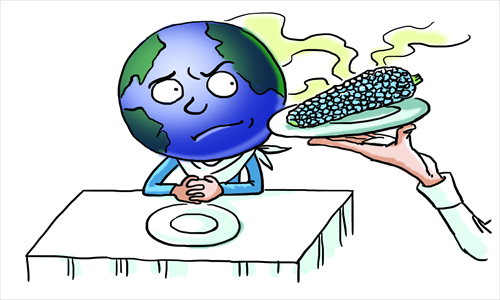Too many doubts remain to be confident in genetically modified food

Alongside the US presidential election earlier this month, a ballot vital to environmentalists and food safety advocates was also taking place in California.
Proposition 37, also known as the "Right to Know" initiative which requires the labeling of foods that are genetically modified (GM), failed to garner the 60 percent of votes needed to pass, dealing a huge blow to the campaign that would otherwise make California the first state to require labeling for GM food.
Supporters of the bill insist that consumers have the right to know what is in their food and make their own decisions.
Agribusiness giants and biotech companies, on the other hand, argue that labeling would confuse consumers, causing more lawsuits and higher cost which would in the end trickle down to consumers.
In the US, where some 80 percent of packaged foods reportedly contain GM ingredients, GM food has long been greeted with green light as the Food and Drug Administration is of the view that Americans have been eating GM food for some 20 years with no serious adverse effects.
Worldwide, however, countries like Australia, Russia, UK, Italy, Japan and China have restrictions on GM food, some in the European Union even ban GM foods altogether.
While biotech companies dismiss most animal tests with GM food as un-scientific or unconvincing, some environmental effects of GM crops have not gone unnoticed.
In October 2009, an ABC news piece "Super weed can't be killed" reported on a super weed that came out of farmland in Arkansas planted with GM soybean and cotton crops. The fast growing weed infested some 400,000 hectares of farmland and even harvester combines were not able to reap the crops.
However, business is good for GM. In 2011, according to CropLife International, market share for GM seeds alone added 21.9 percent, raking in $12.87 billion.
GM food is also used in international food aid. Ertharin Cousin, executive director of the United Nations World Food Programme (WFP), told Xinhua during the World Food Prize symposium in Des Moines, Iowa in October, "We believe when we provide food assistance, that we should let the science lead."
If donors provide food aid to WFP for distribution to meet the emergency food needs of a population, she said, "then we provide that assistance through using those GM crops that's been tested as safe for human consumption… I don't think we have the luxury picking and choosing," when there are 870 million people who don't know where their next meals are coming from.
In 2011, the world population reached 7 billion. By 2050, the figure would surpass 9 billion, meaning farmers will need to produce 70 percent more food on less land than ever before. Many of the world's major biotech companies claim that GM crops would be the key to solving the world's food problems.
The 2012 Global Agricultural Productivity Report released in mid October by Global Harvest Initiative, a private sector policy voice representing agribusinesses such as DuPont, John Deere, Monsanto and IBM, said biotechnology has also improved yields, increased farmer incomes and provided environmental benefits. But many scientists believe otherwise.
In 2008, the International Assessment of Agricultural Knowledge, Science and Technology for Development published a report on agriculture and food production. The report did not endorse the claims of the biotech industry that GM crops will feed the world and produce sufficient biofuels for global transport.
It maintained that GM crops are controversial and that they will not play a substantial role in addressing the challenge of climate change, loss of biodiversity, food security, poverty and hunger. It did not rule out a role for GM crops in the future, but highlighted the problems which the current regime of patenting seeds has on farmers and research.
France is a staunch opponent of GM crops. But it is worth noting that in the Global Food Security Index 2012 report commissioned by DuPont, France was among the most food-secure countries in the world, along with the US, Denmark and Norway, in terms of ample food supplies, high incomes, low spending on food relative to other outlays, and significant investment in agricultural research and development. This does offer some food for thought in developing countries.
Like it or not, GM food is already in our life and might be here to stay.
Richard Horton, editor of British medical journal The Lancet, said, "Seeking a technological food fix for world hunger may be … the most commercially malevolent wild goose chase of the new century." Steven Smith, an insider with the biotech industry, declared before his death in 2003, "If anyone tells you that GM is going to feed the world, tell them that it is not… To feed the world takes political and financial will."
It's high time these warnings are heeded.
The author is news editor of the North America Office of Xinhua News Agency based in New York. opinion@globaltimes.com.cn